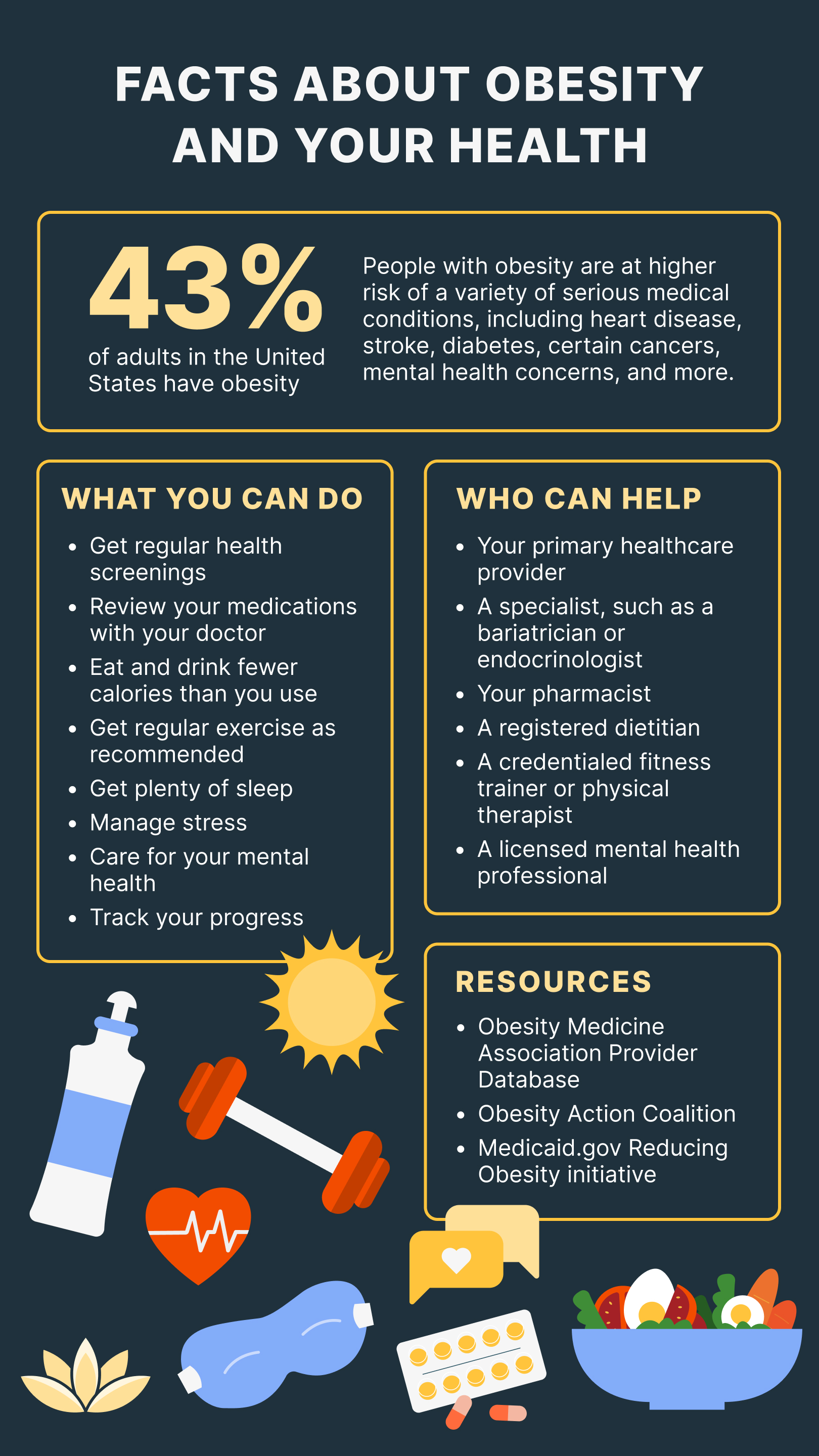Important Facts About Obesity and Your Health

Almost 43% of adults in the United States have obesity, according to research. Living with obesity may challenge your overall health. But you can take action to help decrease the risks.
Here’s what to know to help you feel more empowered in managing your health with obesity.
1. Obesity Increases the Risk of Serious Health Concerns
Obesity is a multi-faceted health condition with far-reaching health effects. Among several other issues, living with obesity increases risk of:
- High blood pressure (hypertension)
- Stroke
- Heart disease
- Kidney disease
- Diabetes
- Cancers of the pancreas, colon, thyroid, blood, brain, or other areas
- Arthritis
- Fatty liver disease
- Fertility issues
- Mental health concerns
Many of these risks are especially heightened if you have excess fat around your abdominal organs.
2. You Can Make Changes to Improve Your Health
Reversing the risks and effects of obesity generally means losing some weight. For example, you may be able to prevent or delay diabetes onset if you lose 5-7% of your bodyweight.
A healthy, balanced diet coupled with regular moderate exercise is a great place to start. That’s because — generally speaking — if you eat fewer calories than you burn, you’ll lose weight.
But in practice, weight loss is often more complicated than calories in versus calories out. Sleep, stress, a busy schedule, emotional obstacles, hormones, medications you’re taking, and other factors can affect your ability to lose weight and your overall health.
Consider each of the following tips:
-
Get screened: It’s important to see your primary care doctor regularly, so they can monitor for diabetes, heart disease, metabolic syndrome, arthritis, cancer, and more. Early detection can help you treat any symptoms sooner.
-
Review your medications: Some medications can cause weight gain, make it more difficult to lose weight, or cause side effects that affect your health. Sometimes, there are different medications you can take with fewer or different side effects. Your prescriber can talk with you about your options.
-
Eat a balanced diet: Focus on nutrition that’s rich in fruits and vegetables, lean or plant-based protein, healthy fats, whole grains, and low-fat dairy.
-
Lean on resources if you need assistance: Services like WIC, SNAP, community programs, or food prescription programs can help if you qualify. These options can provide nutritious foods at a lower cost.
-
Eat less fat and sugar: Ensure that calories from sugar and saturated fat each make up less than 10% of your daily calorie intake.
-
Move your body: Spend at least 150 minutes per week doing brisk activities that get your heart and breathing rates up. Work in two sessions of strength or resistance training each week, too.
-
Bring in support for challenges: Talk to your doctor about physical activity if you have another health condition that may interfere with your ability to exercise safely. A physical therapist or fitness professional may be able to provide guidance for movement if you have physical limitations.
-
Get enough sleep: Adults need about 7-9 hours of sleep every night. Sleep supports so many aspects of health and functioning, so it’s important to prioritize enough rest.
-
Manage your stress: Stress can affect your hunger hormones, causing them to over-signal to your brain and body when it’s time to eat and what to eat. Stress also increases the hormone cortisol, which promotes abdominal fat. Try stress management techniques such as yoga, mindfulness meditation, deep breathing, and leisure or recreational activities in addition to sleep.
-
Care for your mental well‑being: Living with obesity can sometimes take an emotional toll. Your weight does not define your worth. Self-care strategies like affirmations may help you if you struggle with self-esteem. Consider seeing a mental health professional for guidance in handling difficult feelings or mental health concerns.
-
Set goals and track your progress: It can be motivating to track your results and see progress toward your goals. Many people like to use a smartwatch, phone, or even a journal.
Every step you take toward improving your health matters.
3. Your Team Can Support You
Your healthcare team can be there for you as you try to improve your health. Look for understanding providers and other support people, who may include:
- Your primary care provider
- A specialist, such as a bariatrician or an endocrinologist
- Your pharmacist
- A registered dietitian
- A credentialed fitness trainer or physical therapist
- A licensed mental health professional
4. Other Resources Are Also Available
You may also find these resources helpful for further information and support:
- Obesity Medicine: Find an Obesity Medicine Provider
- Obesity Action Coalition: Education and Advocacy
- Medicaid.gov: Reducing Obesity
Want to Read More?
Access all of Dario Connect’s content, community, and experts for free!
Already a member? Login
Want to Read More?
Access all of Dario Connect’s content, community, and experts for free!
sign UP For FreeAlready a member? Login

